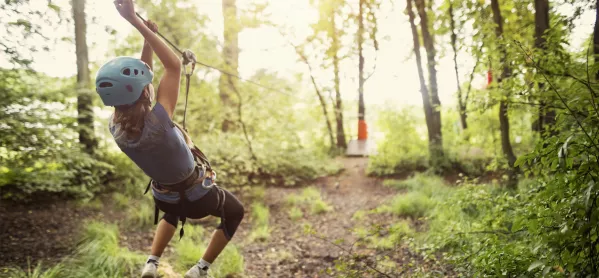- Home
- Teaching & Learning
- General
- Why residential trips must not be a victim of Covid
Why residential trips must not be a victim of Covid

I’m writing in support of residential outdoor learning, at a time when it urgently needs support.
As a headteacher, it is the second paragraph of A Vision for Young People - published in February by Scottish Outdoor Education Centres (SOEC) - that resonates with me most. It calls for an education “where every single young person has the right to progressive outdoor learning including the immersive, residential experiences”.
In normal times, my pupils at Tinto Primary School go on two progressive residential experiences, attending outdoor education centres in P4 and P5 and, then a city residential in P7 as they are getting close to the move up to secondary school.
Background: School trips get green light - but not residentials
Coronavirus: How outdoor learning can help with social distancing
Covid: An outdoor stage has been fantastic for our school
Also this week: More teachers key to ‘education-led’ Covid-19 recovery
The P4-5 residential experience provides a platform for personal development that we cannot replicate in school. All schools have a focus on health and wellbeing which includes developing resilience, emotional wellbeing and confidence, and residential experiences build on this.
We see the children transferring and applying their learning in these areas - and in an interdisciplinary learning (IDL) way - when at outdoor centres. Staff observe pupils flourishing in the outdoors in a way that they do not in the classroom as they solve problems, take risks, push their own boundaries, all the while enhancing their own self-esteem and respect from their peers.
The children learn to become responsible for their belongings; to get themselves to meals and to activities on time; to have the correct equipment packed in their day bags - no parent there to do it for them. They begin to support each other, checking their group is together, that everyone has what they need. They respect their peers in a different way as they celebrate individual and group successes and support those who need that extra bit of encouragement.
The fact that they are living together for four or five full days allows these relationships to grow both among the children and between them and school staff. We see this then transferring back into the classroom and having a positive impact on future learning and relationships.
Everyone in our school community understands this and, as a result, fully supports the residential programme. The two lockdowns have reinforced this, as all staff and parents have seen the effects of remote and home-based learning on the children.
Our children have returned to school from both lockdowns anxious, struggling to work in teams; they have been less resilient as they struggle to adapt to routines, timetables and the need to complete learning tasks. They are anxious about the return to a busy classroom where the teachers wear masks and hygiene is so prevalent. They are less patient, more irritable and give up more easily.
Our children need to have the opportunity to rebuild their own resilience, self-esteem, confidence, courage and relationships.
Schools are doing a great job, and staff have their pupils’ emotional health and wellbeing at the heart of all they do - but we cannot do this alone. We need to work with external agencies and groups, we need support to give the children opportunities to heal, move on and be ready to learn.
Residential experiences and specialist outdoor educators can provide part of this support and should be. But like all good learning experiences, sustainable, continuous and progressive throughout their school career, not reduced to an afterthought.
Alex Stark is headteacher at Tinto Primary School, in South Lanarkshire
SOEC is hosting a cross-party event about the vision and the future of outdoor centres on Monday 15 March at 6.30 pm, when Mark Beaumont and Mollie Hughes will be among the speakers and a panel of MSPs will take questions. More details here
You need a Tes subscription to read this article
Subscribe now to read this article and get other subscriber-only content:
- Unlimited access to all Tes magazine content
- Exclusive subscriber-only stories
- Award-winning email newsletters
Already a subscriber? Log in
You need a subscription to read this article
Subscribe now to read this article and get other subscriber-only content, including:
- Unlimited access to all Tes magazine content
- Exclusive subscriber-only stories
- Award-winning email newsletters
topics in this article



